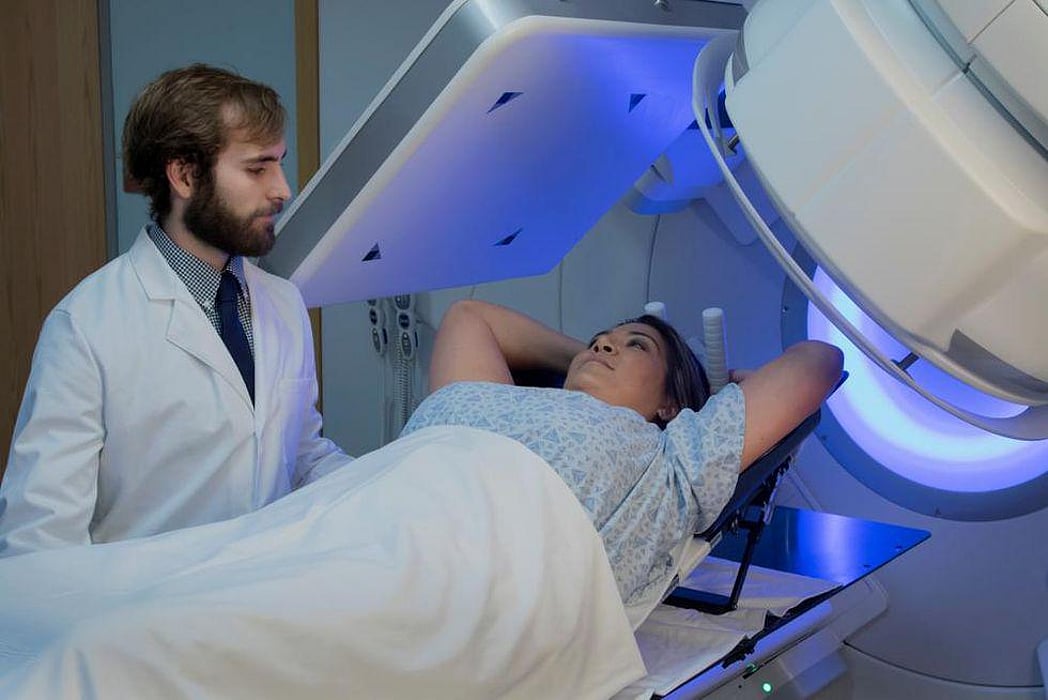American Society for Radiation Oncology, Oct. 24-27

The annual meeting of the American Society for Radiation Oncology was held from Oct. 24 to 27 in Chicago and attracted approximately 11,000 participants from around the world, including physicians, oncology nurses, radiation therapists, biologists, physicists, and other cancer researchers. The conference featured educational courses focusing on radiation, surgical, and medical oncology.
In single-institution phase 2 randomized trial, C. Jillian Tsai, M.D., Ph.D., of the Memorial Sloan Kettering Cancer Center in New York City, and colleagues found that the addition of stereotactic body radiotherapy (SBRT) prolongs progression-free survival among patients with metastatic non-small cell lung cancer (NSCLC) with oligoprogression (isolated disease progression).
The authors randomly assigned patients with metastatic NSCLC and patients with metastatic breast cancer who progressed after at least one line of systemic therapy to either continuation of standard of care per physician choice or SBRT followed by standard of care. The researchers found that the addition of SBRT prolonged progression-free survival. The effect was driven entirely by the NSCLC patients, who derived a more than fourfold progression-free survival benefit compared to standard of care alone. The investigators did not observe any difference with the addition of SBRT in the breast cancer group.
"The study is important because, previously, there was no evidence supporting the use of SBRT in the setting of oligoprogression," Tsai said. "The study will likely make clinicians aware of this treatment option and provide the patients with such information. In addition, this can also lead to a multidisciplinary approach of care in patients with metastatic disease."
In a prospective trial, Matthew Manning, M.D., of the Cone Health Cancer Center in Greensboro, North Carolina, and colleagues found that the ACCURE (Accountability for Cancer Care through Undoing Racism and Equity) approach is an effective tool that can help eliminate disparities between Black and White patients in treatment and survival rates for early-stage breast cancer and lung cancer.
The authors took a community-based participatory research approach to built transparency and accountability into cancer care. The intervention included four components: a real-time informatics tool to flag missed milestones in care, a specialized nurse navigator to help patients overcome obstacles to care, a physician champion to provide health care teams with race-related feedback on treatment completion, and health equity education training sessions for staff. The researchers found that by implementing the ACCURE approach, system-wide changes can be leveraged to eliminate survival differences in cancer care.
"This study has prompted health systems to build patient tracking systems like the real-time informatics tools and proactively identify and eliminate barriers to cancer treatment," Manning said.
Paul L. Nguyen, M.D., of Brigham and Women's Hospital/Dana-Farber Cancer Institute in Boston, and colleagues found that a genomic biomarker (Decipher genomic classifier) from biopsy samples of men undergoing radiation and hormone treatment in phase III randomized trials may accurately predict which patients are at lower versus higher risk of poor outcomes from prostate cancer.
The researchers preserved biopsy samples from three important phase III randomized trials of men treated with radiation and hormone therapy for prostate cancer, all of which included long-term follow-up. Some of these patients were followed for over 20 years. The researchers found that the Decipher genomic classifier was able to predict the risk of distant metastases, prostate cancer death, and overall survival, even after adjusting for clinical factors.
"This opens the door to personalizing the current one-size-fits-all therapy of radiation and long-term hormones for men with high-risk prostate cancer," Nguyen said. "It also provides the rationale to enroll patients in the national NRG GU-009/PREDICT-RT randomized trial that tests whether treatment can be personalized based on the Decipher score. When this trial is completed and reports read out, we hope to have the full justification to personalize therapy by Decipher score."
ASTRO: Prior Authorization Process Costly to Radiation Oncology Clinics
MONDAY, Nov. 1, 2021 (HealthDay News) -- The time and cost burden of treatment-related prior authorization events for radiation oncology practices is considerable, according to a study presented at the annual meeting of the American Society for Radiation Oncology, held from Oct. 24 to 27 in Chicago.
ASTRO: EBRT Underused in Liver Cancer Patients Awaiting Transplant
FRIDAY, Oct. 29, 2021 (HealthDay News) -- Few patients with hepatocellular carcinoma who are wait-listed for liver transplantation receive bridging therapy with external-beam radiation therapy, according to a study presented at the annual meeting of the American Society for Radiation Oncology, held from Oct. 24 to 27 in Chicago.
ASTRO: Long-Term AEs Similar for Shorter-Course RT After Prostatectomy
FRIDAY, Oct. 29, 2021 (HealthDay News) -- For patients who undergo prostatectomy for prostate cancer, hypofractionated postoperative prostate bed radiotherapy is similar to conventionally fractionated postoperative radiotherapy with regard to late genitourinary or gastrointestinal toxicity, according to a study presented at the annual meeting of the American Society for Radiation Oncology, held from Oct. 24 to 27 in Chicago.
Related Posts
Youngest Kids in Class More Likely to Get Prescribed ADHD Meds
FRIDAY, Dec. 16, 2022 (HealthDay News) -- Kids who are the youngest in their...
Hydrocortisone Linked to Lower Risk for Death in Severe Pneumonia
THURSDAY, March 23, 2023 (HealthDay News) -- For patients with severe...
In National Survey, U.S. Ob-Gyns Say Care Has Worsened After Dobbs Decision
WEDNESDAY, June 21, 2023 (HealthDay News) -- The U.S. Supreme Court decision...
AHA Looks at CV Impact of SARS-CoV-2 Infection in Children
MONDAY, April 11, 2022 (HealthDay News) -- Clinical presentation, treatment, and...
